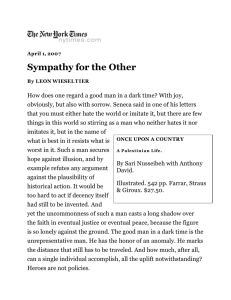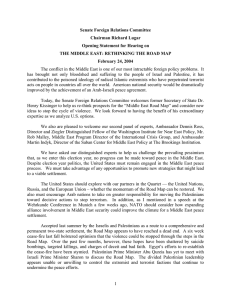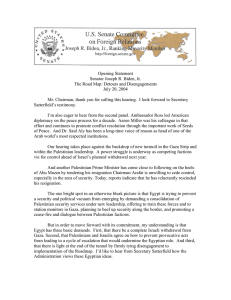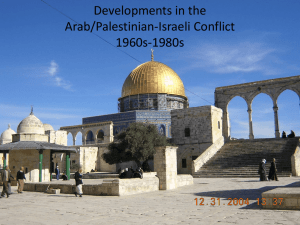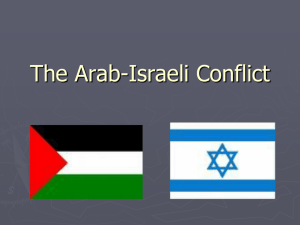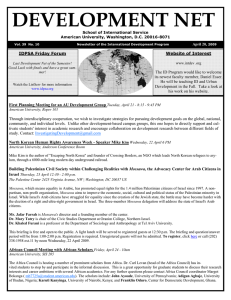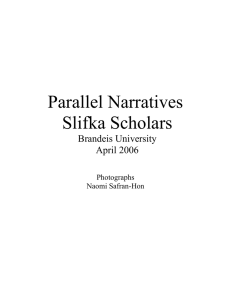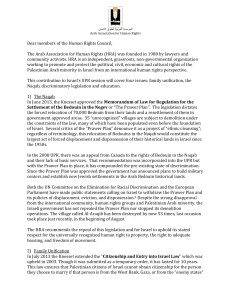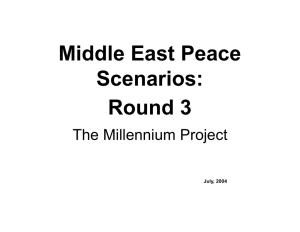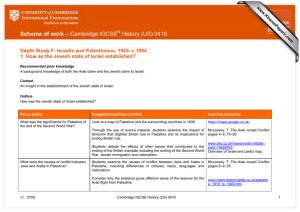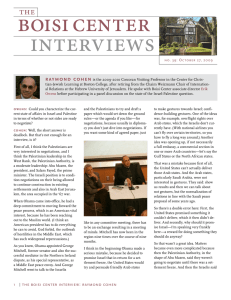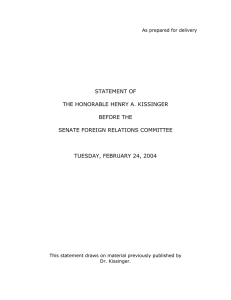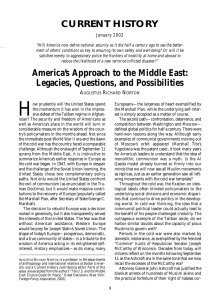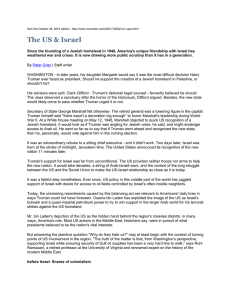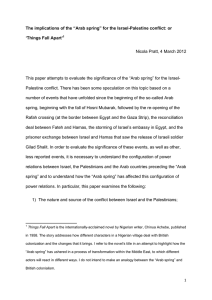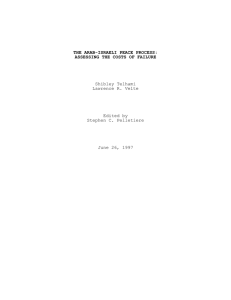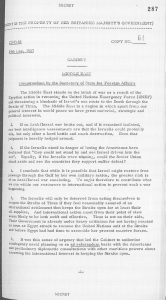Mr. Chairman, thank you for calling this hearing. I... Secretary Kissinger back to the committee. I also am... Opening Statement
advertisement
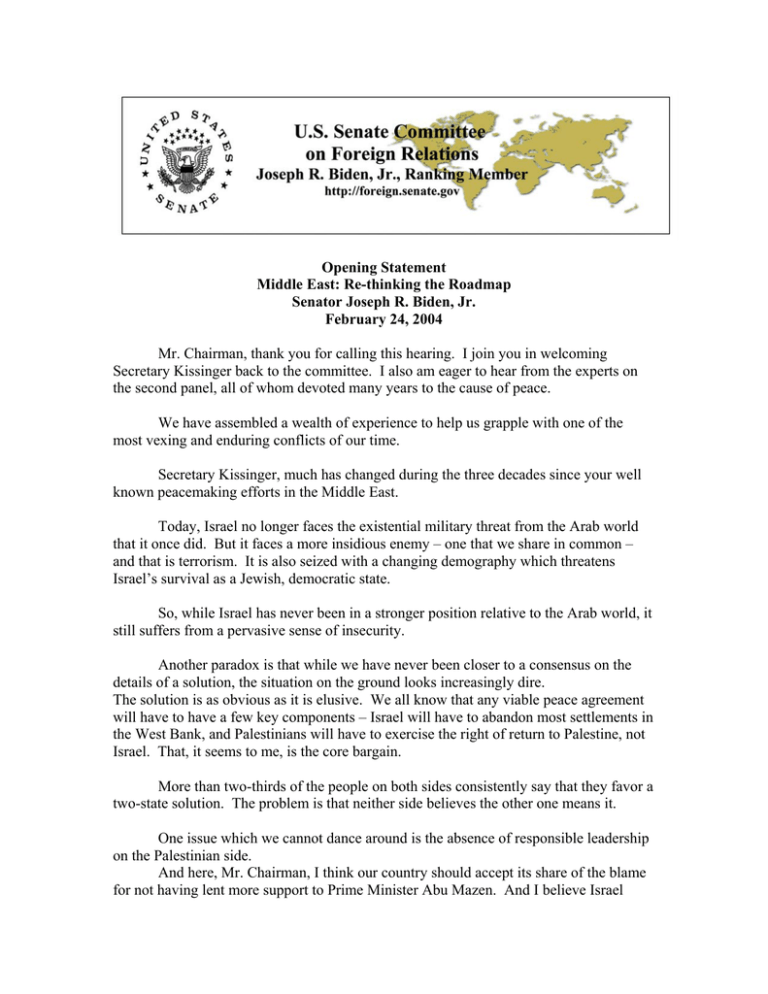
Opening Statement Middle East: Re-thinking the Roadmap Senator Joseph R. Biden, Jr. February 24, 2004 Mr. Chairman, thank you for calling this hearing. I join you in welcoming Secretary Kissinger back to the committee. I also am eager to hear from the experts on the second panel, all of whom devoted many years to the cause of peace. We have assembled a wealth of experience to help us grapple with one of the most vexing and enduring conflicts of our time. Secretary Kissinger, much has changed during the three decades since your well known peacemaking efforts in the Middle East. Today, Israel no longer faces the existential military threat from the Arab world that it once did. But it faces a more insidious enemy – one that we share in common – and that is terrorism. It is also seized with a changing demography which threatens Israel’s survival as a Jewish, democratic state. So, while Israel has never been in a stronger position relative to the Arab world, it still suffers from a pervasive sense of insecurity. Another paradox is that while we have never been closer to a consensus on the details of a solution, the situation on the ground looks increasingly dire. The solution is as obvious as it is elusive. We all know that any viable peace agreement will have to have a few key components – Israel will have to abandon most settlements in the West Bank, and Palestinians will have to exercise the right of return to Palestine, not Israel. That, it seems to me, is the core bargain. More than two-thirds of the people on both sides consistently say that they favor a two-state solution. The problem is that neither side believes the other one means it. One issue which we cannot dance around is the absence of responsible leadership on the Palestinian side. And here, Mr. Chairman, I think our country should accept its share of the blame for not having lent more support to Prime Minister Abu Mazen. And I believe Israel could and should have done more then, too. Giving Abu Mazen so little to deliver to his people played directly into Arafat’s hands. I am not sure when we will get another opportunity like that again. But as the saying goes, we are where we are. The world does not stop turning, in fact it seems to turn ever faster in the Middle East. We are facing an unprecedented set of challenges in a region that has become our primary strategic focus. We are struggling to help Iraq move in the direction of stability, unity, and representative government. We are facing an Arab world seething with discontent and badly in need of political and economic transformation. We have not yet achieved a meeting of the minds with our traditional allies in Europe on an overarching strategy for the Middle East. The Arab-Israeli conflict must be viewed in the context of this volatile strategic climate. And it explains why making progress has never been more important. But some problems do not lend themselves to immediate solutions. Secretary Kissinger, I am intrigued by your argument which essentially boils down to the view that the best we may be able to do now is to help create the circumstances that allow for a solution later. Israeli Prime Minister Ariel Sharon is considering a pull-out of settlements and military installations in Gaza. If the move is carefully coordinated with the United States to ensure a peaceful transition, it could create the conditions for a future “rapid breakthrough” that you mention in your written testimony. I deeply sympathize with Israel’s predicament. But I am concerned, as are many Israelis, that absent buy-in from both sides no lasting settlement is possible. Indeed, a unilaterally imposed solution runs the risk of boosting rejectionists in the Palestinian camp and giving them an excuse to perpetuate violence. While the new Palestinian Prime Minister has shown no inclination to confront Yasser Arafat, there are signs of ferment among the next generation of Palestinian leaders. Strengthening these reformers will not be easy, but it is essential if we are to help the Palestinians achieve the responsible leadership they deserve and do not now have. We must also demand more from the Arab world. I agree with you that among the chief obstacles to peace is the Arab world’s failure to demonstrably accept Israel’s existence. I have suggested to Arab leaders that if they want to help the cause of peace, then they should begin normalizing relations with Israel now. Arab leaders proclaim support for the Geneva Accords, yet they will not entertain the idea of inviting Geneva’s Israeli signatories to places like Riyadh. Finally, Mr. Secretary, I want to underscore a point in your testimony when you say “the American role is central.” I am not certain that the White House understands this. Promoting peace and securing Israel require hard work – day in and day out – as our next panel can attest to. Benign neglect punctuated by episodic engagement imperils American strategic interests in the region. We have no choice but to be involved. Each of you has put forward thought-provoking ideas on how to move forward. I look forward to hearing them. ###
